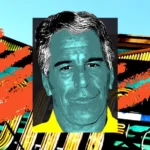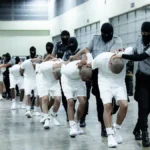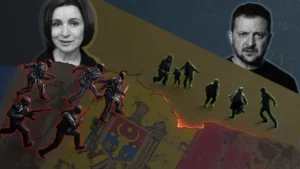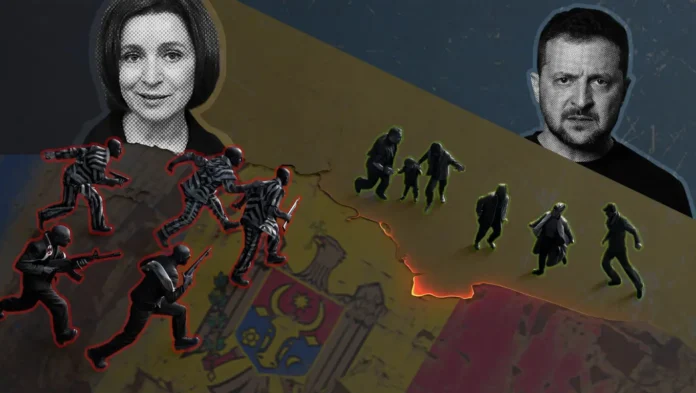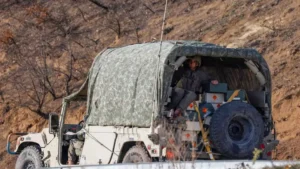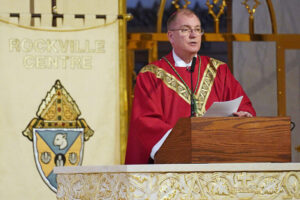A rapid advance by Syrian rebel groups on the country’s capital has led to the collapse of Bashar al-Assad’s control of a nation his family had ruled for half a century.
Crowds celebrated the seismic political shift in the streets of Damascus overnight and into Sunday, as Syrian state television broadcast a statement from a group of rebels, one dressed in a black hoodie, who announced that all Syrian prisoners had been freed from jail and Assad had been deposed.
The man reading that statement on television, just hours after the city’s fall, had echoed calls from the leading group in this lightning rebel offensive, Hayat Tahrir al-Sham, demanding that citizens and fighters alike ensure the country’s national institutions were protected.
He ended his statement with a declaration after more than 13 years of bloody civil conflict: “Long Live a Free Syria.”
Another separate video showed the country’s prime minister, Ghazi al-Jalali, being escorted from his home by armed rebels to hand formal power to a committee formed from various rebel groups, known as the Syrian Military Operations Command.
Assad’s downfall came less than two weeks after an initial incursion west of the country’s second largest city, Aleppo, triggered a cascading series of routes and retreats by the demoralized Syrian military.

The British-based war monitoring group, the Syrian Observatory for Human Rights, said Assad had left the country to an undisclosed destination.
Hours later, Russia, which had long used its military to prop up the Assad regime against wide-ranging opposition forces, also said that the toppled president had left the country.
The Russian foreign ministry did not say where he had gone.
“As a result of negotiations between B. Assad and a number of participants in the armed conflict on the territory of the Syrian Arab Republic, he decided to resign from the presidency and left the country, giving instructions for a peaceful transfer of power,” the foreign ministry said in a statement.
“Russia did not participate in these negotiations,” it added.
Questions about what comes next
The United Nations, United States and other governments worldwide have acknowledged this weekend’s events as a highly significant, watershed moment, with the U.N. calling for the rebels to host talks that can lead to a more inclusive government for the country.
The UN’s lead envoy to Syria, Geir Pedersen, said the more than a decade of brutal civil war had left deep scars in Syria, but now was the time for all parties to prioritize dialogue, and he would be looking forward with “cautious hope” for the nation’s new developments.

Efforts by the UN and others to build a successful transitional government will be complicated by the fact that Hayat Tahrir al-Sham, the Islamist group that has led this offensive to topple al-Assad, is still designated as a terrorist organization by the U.N., U.S. and others.
The group’s leader, Abu Mohammed al-Golani, has however sought to present a far more moderate face in recent months, as analysts have told NPR.
But while Germany’s leading diplomat has described al-Assad’s toppling as a “great relief” for Syria’s people, she has also cautioned against radicalization, particularly given what’s expected to be HTS’s leading role in any future form of government.
“The country must not now fall into the hands of other radicals,” said Annalena Baerbock, the German foreign minister, “whatever form they take.”
CLICK HERE TO READ MORE FROM THE REPUBLICAN VOICE
Iran, which together with Russia played a leading role in supporting al-Assad’s rule for many years, made unverifiable claims that rebels had attacked its embassy in Damascus on Sunday, airing footage from a television network that seemed to show a diplomatic compound.
However, diplomats had reportedly left the embassy before any attack, according to an online post in the Iranian newspaper The Tehran Times, which cited the country’s foreign ministry.
Russia has long maintained an airbase and naval repair hub in Syria, but the Russian embassy in Damascus has said its staff are fine and those bases appear unharmed.
Nonetheless, a leading foreign affairs lawmaker in the upper house of the Russian parliament has said Assad’s departure will mean difficult times ahead for Syria, a country known for its patchwork mosaic of ethnicities, religions and political affiliations.
“Syria is a very difficult story, for everyone without exception,” said Konstantin Kosachyov, who is deputy chair of the Russian Senate. “One way or another, the civil war will not end today, there are too many opposing interests and too many opposing forces.”

“The situation has evolved very quickly,” according to Phillippe Lazzarini, the head of the UN agency dedicated to Palestinian refugees, UNRWA.
“It’s like the fall down of a house of cards.” He told NPR at a policy forum in Qatar that his organization’s camps in Syria house around 400,000 people, but have largely remained calm with some services continuing to operate.
He said he hoped the transition process would allow schools to reopen in the camps.
Israel heightens security, as Lebanon opens border crossings
Meanwhile in neighboring Israel, authorities are strengthening their security measures in the Golan Heights, the border region that Israel largely seized from Syria in the war of 1967.
The Israeli military said it had helped U.N. peacekeepers based in the region to stave off several armed men over the weekend, but would not interfere in Syria’s internal events, and would simply keep certain areas of the Golan Heights closed to act as a buffer zone for security reasons.
On another Syrian border — with Lebanon — over which at least a million Syrians have fled as refugees since the start of their country’s civil war, Lebanese authorities have instead opened the border crossing in anticipation of a reverse flow of refugees seeking to return home after years away.
Israeli airstrikes in recent weeks have damaged several of the border crossings between Lebanon and Syria, through which the Israeli military says the armed group Hezbollah has often sought to smuggle weapons that ultimately originate in Iran.
CLICK HERE TO READ MORE FROM THE REPUBLICAN VOICE
The Lebanese army — still working to redeploy troops to its southern border with Israel as part of a recent ceasefire agreement — has said it’s also sending more units to its northern and eastern borders with Syria, in light of recent events.
source: npr.org/syrian-government-appears-to-have-fallen-in-stunning-end-to-long-rule-of-assad-family

